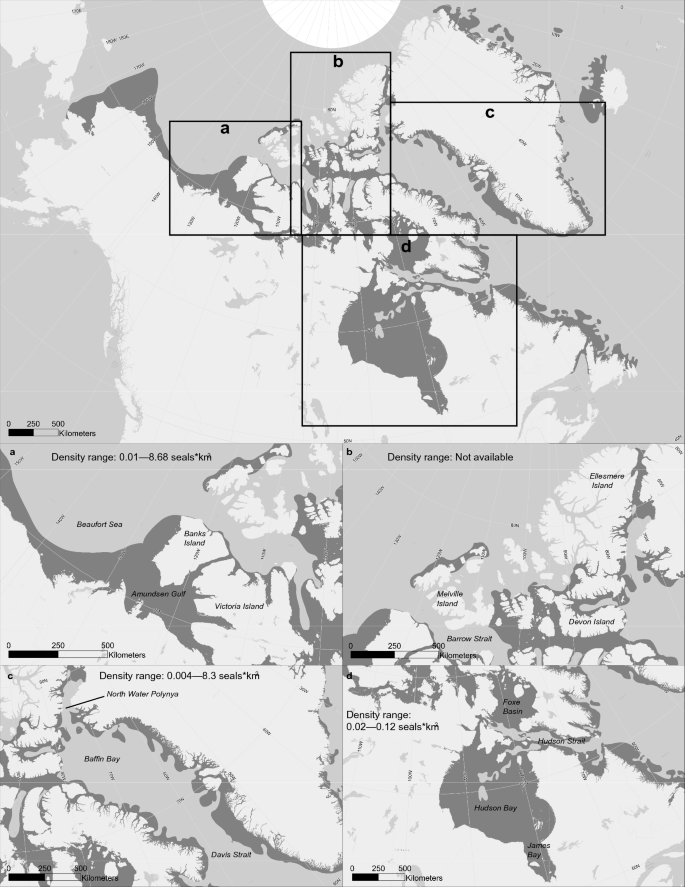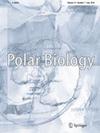对加拿大北极地区胡须海豹(Erignathus barbatus)的航空调查密度估计的回顾突出了重要的知识空白和研究需求
IF 1.6
4区 环境科学与生态学
Q3 BIODIVERSITY CONSERVATION
引用次数: 0
摘要
由于气候变化,北极地区的海冰已经显著减少,对冰性海洋哺乳动物的可用栖息地产生了可测量的影响。胡须海豹(Erignathus barbatus)分布在极地周围,主要栖息在有季节性浮冰覆盖的较浅的沿海地区。然而,关于加拿大境内胡须海豹的数量和密度的信息有限,也没有正式的估计。在这里,我们回顾了1974年至2022年进行的航空调查的历史现场报告和出版物,以编制加拿大水域胡须海豹的密度和丰度估计。对加拿大北极地区的几个地区进行了海洋哺乳动物的航空调查,包括波弗特海(1974-2006)、加拿大高纬度北极(1979-2022)、巴芬湾-戴维斯海峡(1979-2014)和哈德逊综合设施(1994-2017)。在回顾了所有已发表的数据来源后,我们报告说,在这些调查期间,加拿大有髯海豹的密度在波弗特海最高(且变化很大)(0.01-8.68只*km−2),其次是巴芬湾-戴维斯海峡(0.004-8.3只*km−2),在哈德逊综合区最低且年际变化较小(0.02 - 0.12只*km−2)。我们还确定,胡须海豹更常出现在斑块状冰盖(50-75%)的浅水深度≤500米的地区。此外,该审查确定了加拿大北极和亚北极地区需要更新航空测量信息的区域。量化加拿大胡须海豹的丰度和密度估算对于监测一段时间内的种群状况至关重要,以便更好地了解该物种如何应对由人为活动和气候变化引起的环境变化。本文章由计算机程序翻译,如有差异,请以英文原文为准。

A review of aerial survey density estimates of bearded seals (Erignathus barbatus) in the Canadian Arctic highlights important knowledge gaps and research needs
Abstract There has been significant sea ice loss in the Arctic as a result of climate change, with measurable impacts on available habitat for ice-obligate marine mammals. Bearded seals ( Erignathus barbatus ) have a circumpolar distribution and primarily inhabit coastal areas of shallower depths with seasonal pack ice cover. However, there is limited information and no formal estimates on population abundance and densities of bearded seals within Canada. Here, we review historic field reports and publications from aerial surveys conducted from 1974 to 2022 to compile the density and abundance estimates of bearded seals across Canadian waters. Aerial surveys for marine mammals have been flown in several areas across the Canadian Arctic, including the Beaufort Sea (1974–2006), Canadian High Arctic (1979–2022), Baffin Bay-Davis Strait (1979–2014), and the Hudson Complex (1994–2017). After reviewing all published data sources, we report that the density of bearded seals in Canada were highest (and highly variable) in the Beaufort Sea (0.01–8.68 seals*km −2 ), then in Baffin Bay-Davis Strait (0.004–8.3 seals*km −2 ), and lowest and less variable inter-annually in the Hudson Complex (0.02 to 0.12 seals*km −2 ) at the time of these surveys. We also determined that bearded seals are more often found in areas of patchy ice cover (50–75%) with shallow water depths ≤ 500 m. Further, this review identifies regions within the Canadian Arctic and sub-Arctic that require updated aerial survey information. Quantifying the abundance and density estimates of bearded seals in Canada is essential for monitoring population status over time to better understand how this species is responding to environmental variation from anthropogenic activity and climate change.
求助全文
通过发布文献求助,成功后即可免费获取论文全文。
去求助
来源期刊

Polar Biology
生物-生态学
CiteScore
3.60
自引率
11.80%
发文量
116
审稿时长
3-8 weeks
期刊介绍:
Polar Biology publishes Original Papers, Reviews, and Short Notes and is the focal point for biologists working in polar regions. It is also of interest to scientists working in biology in general, ecology and physiology, as well as in oceanography and climatology related to polar life. Polar Biology presents results of studies in plants, animals, and micro-organisms of marine, limnic and terrestrial habitats in polar and subpolar regions of both hemispheres.
Taxonomy/ Biogeography
Life History
Spatio-temporal Patterns in Abundance and Diversity
Ecological Interactions
Trophic Ecology
Ecophysiology/ Biochemistry of Adaptation
Biogeochemical Pathways and Cycles
Ecological Models
Human Impact/ Climate Change/ Conservation
 求助内容:
求助内容: 应助结果提醒方式:
应助结果提醒方式:


